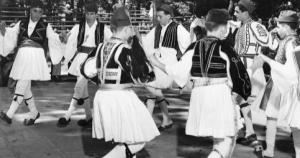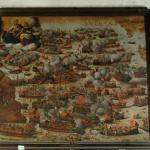 Missing all the trends is not missing culture.
Missing all the trends is not missing culture.
This mistake, confusing the spirit of a particular age with God’s plan in history, is easy to make. Sometimes in history a group of people are cut off from information in the rest of the world by tyrants. Other places are described as “backwaters” and so the stories they might tell are ignored or viewed as “primitive.”
Those West Virginia hills saw many generations of both sides of my family be born, live, and die. When we moved to New York, I recall my old home being described as “backward” by the teachers in New York. All the images of wonderful West Virginia in books were black and white and dealt with what was bad about “almost Heaven West Virginia.” Worse, I knew of people in West Virginia who accepted this assessment. They would destroy or discard beautiful quilts created by family to get modern blankets. I would then see quilts like those they trashed justly hanging in museums! Sadly, the quilts would often be given the name “folk art” as if the “modern art” was better or somehow more sophisticated. One need not dislike modern art to think that the beautiful hand stitched work was at least as marvelous as the signed urinal.
My mom was the first person I knew who saw the snobbery, but also the sheer loss of those who did not understand the artistry of the story-tellers. She tried to record some of those stories, though the story tellers were shy around a microphone. Why? She knew they might be lost, have been lost, since too many of us were rushing off to college and getting a second-hand (and often second-rate) experience of other cultures while losing something marvelous.
The kind of singing I heard as a boy, and many of the songs, are lost forever.
I thought of this while reading deeply about the Greek independence movement. Often other Europeans coming to Greece used terms like those that were also used to describe West Virginia culture. They were correct that the tyrants keeping other ideas from Greece were wrong. They were deeply wrong to think they had nothing to learn from traditional Greek culture that had just survived four hundred years of occupation. This was a chance for learning as well as helping.
An ancient “folk” culture has a great advantage over anything contemporary. The ancient culture can be shared and enjoyed by many generations of living people. This experience also carries the weight of the old remembering their own grandparents (or great-grandparents!) doing similar art, dances, or liturgical celebrations while the young rejoice that someday their own children will participate. This experience cannot be replicated instantly!
The traditional culture is also not static as a version of any great “text” that began as mostly an oral performance, such as the Iliad, shows. The local performance may vary and a region may even develop an alternative version of the myth! The common liturgy of a Greek church may receive local variants without touching the core theology. These different styles of iconography, even if nearly invisible to the untrained eye, matter. They should have been watched, studied, and not denigrated! Instead, one can visit places where outside “scientists” moved entire villages and blasted through ancient churches to get to more ancient artifacts from the era of Greece (usually classical or Homeric) that intrigued them! How much was lost?
We can never be sure.
A destruction of a “folk way” is dangerous and almost always a loss to human goodness, truth, and beauty. Reading about the endurance of the Greek nation under tyranny is exciting, but pausing to see what can be learned from the people of the time is educational. Instead of merely bringing what had been kept from the Greeks, which was good, the allies of Greek civilization, the philhellene, should have adopted the cautious posture of learners. The living Greeks had endured: how? The living Greeks: had produced a way of living that included tales, art, all forms of culture. What are those?
The dismissal of the wisdom of the grandparents, the folk ways, is an error that brings great loss. Folk art is art. Oral tales can be great stories. Ancient dances are beautiful to perform today not as artifacts of the past, but as beauty made incarnate.
What is true of West Virginia, of Greece at the time of the War for Independence, is true today all over the world. God help us to look, listen, and learn.












